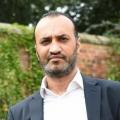
Muslim groups met with the police and the senior members of the coroner’s office at a special conference at Lancashire Constabulary headquarters.
The 'Muslim Bereavement' Conference aimed to explain the processes behind autopsies and CT scans as well the work of the coroner’s office.
The issues were of particular relevance to Muslims families, as tradition dictates when a person dies they should be buried as quickly as possible.
Lancashire Partnership Against Crime (LANPAC) and Lancashire Constabulary hosted the event for key members of the Muslim communities, who heard from professionals and also shared their own thoughts on issues relevant to deaths and burials.
Coroners investigate when a death is unnatural, the cause of death is unknown, or a person dies in prison or police custody.
The investigation process often means a body can not be buried immediately, which can cause concern and confusion for some.
The conference was opened by Lancashire’s Chief Constable, Chris Rowley, with presentations from Maulana Arif Patel from Sunni Dawati Islami UK, Senior Coroner Dr James Adeley, coroner's officer's manager Alice Swarbrick, Dr Simon Beardmore, Lead Consultant Radiologist at Royal Preston Hospital, and Sgt Steve Hardman, Road Lead Investigative Officer/Family Liaison Officer.
The audience was made up of Muslim burial committee members, councillors, NHS workers and volunteers from across Blackburn, Preston, Pendle, Lancaster, Hyndburn and Burnley.
The police had also invited relevant officers so they could speak to attendees first-hand over any concerns and issues they may have had.
Speaking on the day Maulana Arif Patel explained the Islamic perspectives on death and the burial process.
He aimed to clarify the reasoning and Islamic beliefs regarding burials as well as organ donation and autopsies.
Chief Constable, Chris Rowley, who worked with Muslim populations during his time with South Yorkshire Police, told the audience he had aimed to educate himself on the burial processes within Islam and was also gifted a Quran during a visit to a mosque, which he had been reading.
He said he ‘recognised the necessity for speed of burial but sometimes the actions which are required from officers may slow that down’ and this was the reality.
About 50 per cent of deaths are handled by doctors and the remaining are dealt with by a coroner.
In recent years, with the growth of Muslim burial societies in towns, the process has become quicker, with coroner’s offices speaking to one designated contact.

Dr James Adeley and Alice Swarbrick gave a detailed account of the process and work of a coroner, and clarified the rules and regulations were in place for all faiths.
Dr Adeley said: “We recognise you need the burial to take place as soon as possible.
“We also recognise the Ghusl (washing of the body) takes time and organisation.
“We are also aware you are operating against times at the burial grounds. So, we will work around this.”
He clarified that working in partnership with other organisations staff had a basic understanding that families would want the body to be released, and this was to do with their faith and not for any other reasons.

In his presentation Dr Simon Beardmore explained how CT Scans were conducted and the reasoning behind them.
LANPAC manager, Al Yusuf said: “It is important we engage with our diverse communities in Lancashire, and we hope this event organised by Lancashire Partnership Against Crime in association with Lancashire Constabulary provided the delegates a better understanding on the roles of the professional bodies and the current protocols in place in dealing with Muslim bereavements.”





Comments: Our rules
We want our comments to be a lively and valuable part of our community - a place where readers can debate and engage with the most important local issues. The ability to comment on our stories is a privilege, not a right, however, and that privilege may be withdrawn if it is abused or misused.
Please report any comments that break our rules.
Read the rules here